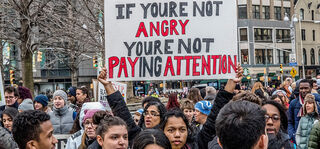
We may think about our most memorable experiences but less often about memorable objects. Those can illuminate who we were and perhaps are.
What would the Museum of You include? My Psychology Today article today helps you do it.

We may think about our most memorable experiences but less often about memorable objects. Those can illuminate who we were and perhaps are.
What would the Museum of You include? My Psychology Today article today helps you do it.

Many people would like life to be easier. less complicated and stressful. My Psychology Today article today offers some ideas.

We all like people who are like us. So, it’s no surprise that mirroring our conversation partner’s behavior will both make them like us more and be open to our ideas.
Indeed, we all want to persuade, whether it’s to watch the movie we want, close that customer or donor, or get that no-longer special someone out of our life.
Of course, you don’t want to be a phony, but there’s a big difference between being phony and being adaptable. Only the self-absorbed act the same way with everyone. So, My Psychology Today article today offers ways in which we can flex to be more in sync with our conversation partners.


We think of counselors as conciliators. Yet even they—after the clients are gone—are not above arguing. My Psychology Today article today presents both sides of seven common debates.

There's something better than the pursuit of happiness.
To explain, some people could be happy, at least for a while, being high all day while being ministered by sycophants. But contentment is more encompassing, more permanent. and more worthwhile.
How can you gain greater contentment. My Psychology Today article today offers thoughts.

Whether you’re the helping professional or the client, we’ve all gotten used to remote sessions. I had been conducting them long before COVID but have done many more during the pandemic.
My Psychology Today article today offers some things I’ve learned that may be of help.

Becoming an adult isn’t easy. Young adults have to take on so much so
quickly. My Psychology Today article today offers a list, each with a suggestion that might make it
easier.
Imitators are often viewed as inferior, lacking in creativity. Not so fast. Good imitators are worthy in themselves, and imitation is usually prerequisite to good creativity. Imitate the masters and that becomes suffused into your creativity. Imitation is also a good way to learn the basics. I offer examples in my Psychology Today article today.

Today, a friend described life in 12 words, “You live, you get old, you get sick, you die. That’s it.”
My Psychology Today article today fleshes that out.
My Psychology Today article today offers suggestions on how to make the most of this ubiquitous tool, whether you're giving reviews or getting them.

Whether because of COVID or other factors, more of my clients are
living relatively isolated lives. Some are happy with that, but not all.
My Psychology Today article today offers three composites and my advice to each.

Some people seek noise, for example, those who enjoy a buzzy restaurant, nightclub, even a deafening concert.
But other people have too much noise in their life. They may even have gotten so used to it, they’re not aware of it, even though it’s stressful and distracting. My Psychology Today article today is for such people.

If this were my final post on Psychology Today, I’d make these points. They’re the ones my career and personal coaching clients have found most useful. At some point, they’ve all been said in this blog, sometimes more than once, but this post aggregates them.

Halloween parties go way back to the 10th-century Celtic festival of Samhain, when people would light bonfires and wear costumes to ward off ghosts.
Today’s Halloween party may not ward off ghosts but offers an opportunity to create a psychologically rich experience. My Psychology Today article today describe the Halloween party my wife and I will be throwing.

After all, disproportionately, gentle souls are listeners, reflective, patient, and considerate. My Psychology Today article today offers some ideas that the gentle soul might find helpful.

A recent post made the case for radical honesty, and a follow-up addressed reader yes-buts. My Medium.com article today discuses, with ample examples, radical honesty’s limits.

Many psychotherapists, counselors, and their clients are pleased with their efforts' efficacy. But even many of them wish for better. The future may provide it.
My Psychology Today article today presents three possible improvements, both to offer hope for the future and to suggest ideas for people interested in a career that could additionally improve humankind's mental health.


A number of my clients have lamented that they didn’t trust their
first instinct about a potential romantic partner. It might help to ask yourself the questions I offer in my Psychology Today article today.

Society’s mind-molders—schools, colleges, news media, and entertainment media—are moving us to believe in a "we not me," community, collective approach to policy and individual behavior.
Yet some people, often cowed by the 3 Cs of Censure, Censor, and Cancel, quietly believe that greater net good accrues from the primacy of the individual and largely free-market capitalism.
Such people believe that the freedom to decide where best to devote their time and treasure will yield more good than surrendering it to the state or even to social pressures. They point to Communist countries, with shortages rife because too many people wouldn’t sustainably work hard when they would get the same pay for doing minimal work.
Pro-capitalist people may support a taxpayer-paid safety net but fear that additional forced redistribution from society’s taxpaying contributors yields a net negative, eating our seed corn. Thomas Sowell wrote, "One of the sad signs of our times is that we have demonized those who produce, subsidized those who refuse to produce, and canonized those who complain."
My Psychology Today article today may be helpful to people who are swimming against the tide.